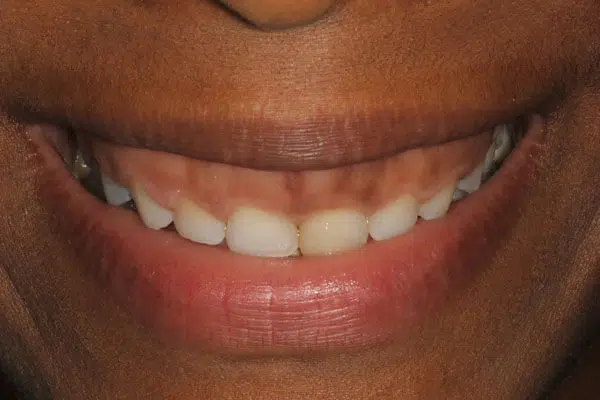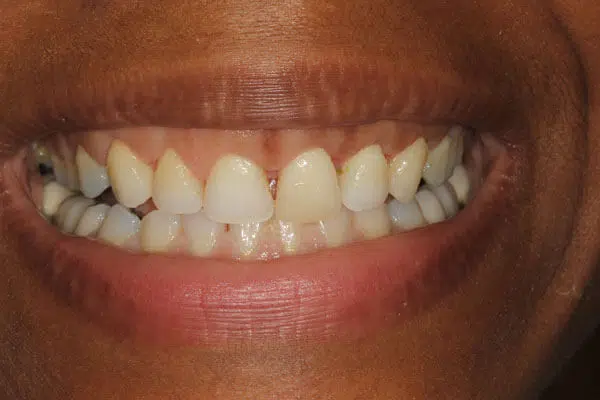What is a gummy smile?
A gummy smile, known in dental terms as excessive gingival display, is when the gums are showing too much making the teeth appear small. About 10-20% of people are estimated to have gummy smiles or have the perception that they show too much gum tissue. Gums frame the smile, like the way a frame houses a picture. When the gums are not in the correct proportion relative to the teeth, the smile does not look nice. Typically, the amount of gums that show should be in the range of 2-3mm from the bottom of your lip to the top of your teeth, with women showing a little more gums than men. If more gums show more than this amount, the teeth can appear smaller or the gums can look very large giving someone a gummy smile look.

Gummy smile caused by braces and gum overgrowing the teeth making the teeth look small

Gummy smile correction with a dental laser that removed gum tissue and reshaped them around the teeth giving them the correct proportion enhancing the esthetics of the smile
Why do people have gummy smiles?
There are many reasons for gummy smiles.
- Jaw Growth: As you age and develop, your jaw grows down and out. The teeth and gums grow along with the jaw. The teeth grown down and the gums grow upward. In some instances, the gums do not grow in the right direction or at the right speed relative to the teeth. This process, known as delayed passive eruption in dental terms, can result in a gummy smile. Other times your upper jaw can be out of position making the upper jaw look a lot longer than it should.
- Hypermobility of the Lip: The muscles of the face, elevator muscles, are responsible for movement of your upper lip when you smile. In some people, their muscles can pull on the upper lip and cause them to elevate the lip higher than normal. When your upper lip is ‘hypermobile’ you will show more gums than average even if the amount of gum tissue you have is normal.
- Inflamed Gums: Bacteria in the gums can cause them to become inflamed and swollen. Gums that look puffy or enlarged because of gingivitis or gum disease can give the appearance of a gummy smile. In some cases of severe gum disease, the gums can overgrow the teeth. Common causes of gum disease and inflamed gums include, poor oral hygiene, not getting regular cleanings, orthodontics (braces can be a food trap), pregnancy (hormone changes can cause inflamed gums), and medical diseases.
- Genetics: Some people have small teeth crowns that can make gums look bigger while others have more gum display. Much of this can be genetically determined.
Treatments to Correct a Gummy Smile
There are many treatment options available for correcting a gummy smile, including a laser gum tissue removal, upper lip repositioning, jaw surgery & braces, and Botox. Treatment will depend on why you have a gummy smile in the first place. Treatment options include:
- Laser tissue removal: This procedure uses a laser to remove some gum tissue and reshape the way your teeth look. This procedure is fast and painless with immediate results. Full healing can usually take 6-12 weeks.
- Orthodontics (Braces): When the teeth are out of position and have not developed enough, moving the teeth down can push the gum tissue up like what happens during development.
- Jaw Surgery (Orthognathic Surgery): This is a more intensive procedure that resets your upper jaw in a proper position to make the upper jaw not look as long. This procedure is done in a hospital setting by a surgeon.
- Lip repositioning: This procedure is used for a hypermobile upper lip and it ties the inside of the upper lip to the gums restricting the movement of the upper lip. Because this tying is done on the inside of the upper lip, it does not have any appearances people will notice and it does not leave any scars.
- Botox: This treatment uses a neurotoxin known as botulinum toxin A or Botox. By temporarily paralyzing the muscles used to elevate the lip, the gums will appear smaller because the upper lip will mask the amount of gum tissue you have. Botox needs to be repeated every 3-6 months once the effects of the neurotoxin wear off.
A gummy smile can affect your confidence and desire to smile. Because there are so many treatments available to correct this problem, contact your periodontist today to find out about why you have a gummy smile and what can be done to treat it.
